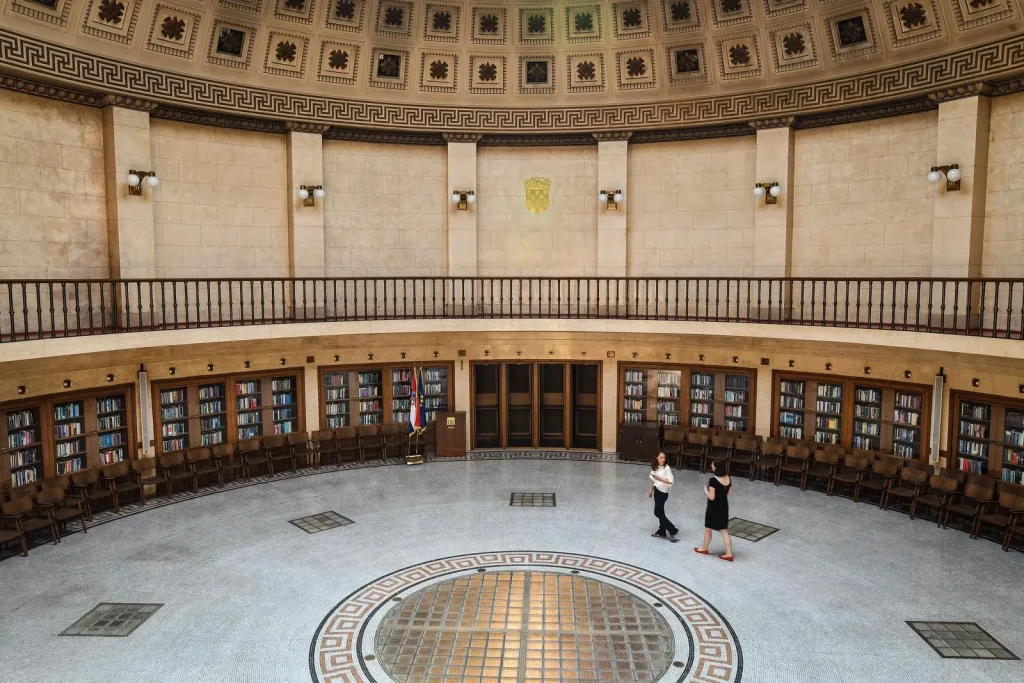On 25 June 1991, parliament adopted a constitutional decision on Croatia’s sovereignty and independence and the following 8 October, a decision severing all ties with the former Yugoslavia. That day, the government adopted a decree on the HNB which went into force on 23 December.
Prime Minister Andrej Plenković said the HNB was the central institution of Croatia’s monetary system and that its 30th anniversary was occurring in challenging circumstances due to the pandemic as well as at a time of transformation as Croatia was integrating with the euro area.
He said the HNB had an important stabilizing role in the first decade of Croatia’s independence as well as significance which manifested when the global financial crisis broke out in 2008.
Then, with monetary policy measures, the HNB cushioned the effects of the crisis on the economy, preserving exchange rate stability, releasing additional liquidity, and contributing to the state’s stability, he added.
Croatia completing euro area preparations as the fourth decade of independence begins
Speaking of Croatia’s goal to join the euro area on 1 January 2023, Plenković said the common currency was a logical instrument not just to achieve deeper integration, but primarily to fully exploit the potential of the single market.
With a population of over 340 million, the euro area is the second largest world economy, accounting for 15% of the world’s GDP, while the euro is the second most important world currency, accounting for 38% of global transactions, the prime minister said.
Surveys show that 79% of the euro area population support the common currency, while only 15% are against it, although support has gone up during the pandemic, he added.
At the start of the fourth decade of its independence, Croatia is completing preparations for adopting the euro and achieving closer integration with the EU, he said.
“Adopting the euro will be a key step for Croatia towards boosting the economy’s competitiveness and bigger economic sovereignty,” he said, adding that it is certainly in Croatia’s interest to share the same currency with its main trade partners.
Plenković said the decision on Croatia’s accession was expected in mid-2022 and that when it joined the euro area six months later, the currency risk and exchange costs would disappear for businesses and citizens, it would have a positive effect on exports and tourist arrivals from the euro area as well as stimulate foreign investment.
He cited the example of Lithuania, which introduced the euro in 2015, saying that since then gross pay has gone up 59% and prices 10%.
In Croatia, between 2015 and 2020, gross pay went up 21% and prices 2.4%.
President wistful about Croatia losing its currency
President Zoran Milanović said that besides the Croatian Army, the HNB was the institution that had done a good job in these 30 years, while all the rest, including courts, the State Attorney’s Office, and all governments, had ups and, unfortunately, more downs.
Regarding euro area accession, the president said he was looking at Croatia’s losing its currency with a dose of wistfulness.
He said the decision to adopt the euro was a political one and that it would be good for the economy because of its structure, including the high share of services and tourism.
However, he added, Hungary, the Czech Republic, and Poland have not introduced the euro and, with good arguments and acceptance from their citizens, show tendencies and a clear direction to do things their way.
He said the Czech Republic was borrowing cheaper and more favorably than some euro area member states, wondering how to explain that. Therefore, he added, one should not have absolute views and there should be no dogmas.
The president said Lithuania was the only example of pay rises in the euro area. On the other hand, he added, there are countries where salaries are stagnating or even falling. The Italian economy has been stagnating for 20 years and has never adjusted to the euro, he said.
Speaking of cryptocurrencies, Milanović said everything should be done to control that segment and ban it if necessary. “It’s terribly dangerous.”
He said abolishing paper money was educationally bad as children must see money to understand its value.
Governor proud of central bank
HNB governor Boris Vujčić said he was proud that they had built such an institution, underlining the real autonomy which the political authorities had given it. Thanks to this autonomy, “we have managed to build an institution which is recognized the world over,” he said, adding that the HNB promotes excellence and competence.
Asked by the press if he, too, was wistful about the changes that joining the euro area would bring, Vujčić said he was convinced that it would benefit all citizens, which would prove important in the next crisis.
He said Croatia’s accession would be a new challenge for the HNB, which would keep all its functions as the central bank, except decisions on the monetary policy.
As for Milanović’s mention of the Czech Republic, Vujčić said it would profit by introducing the euro, but considerably less than Croatia because it is much less euroized.
Asked about cryptocurrencies, he said everyone should be aware of the risks and advised extreme caution “because it’s an absolutely speculative type of investment. It’s not money that replaces the money issued by central banks.”
Finance Minister Zdravko Marić told the press he did not agree with the president’s claim that Lithuania was perhaps the only positive example of euro adoption, saying that Slovenia, the Baltic countries, Cyprus and Malta had benefited from it.
Deputy Parliament Speaker Željko Reiner recalled that the kuna was introduced as the national currency on 30 May 1994, replacing the dinar, but said Croatia had aspired to European monetary integration since 1991.
He noted that euro coins will have Croatian motifs, including the marten (kuna) on the €1 coin.
For more on politics, follow TCN’s dedicated page.








